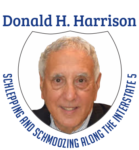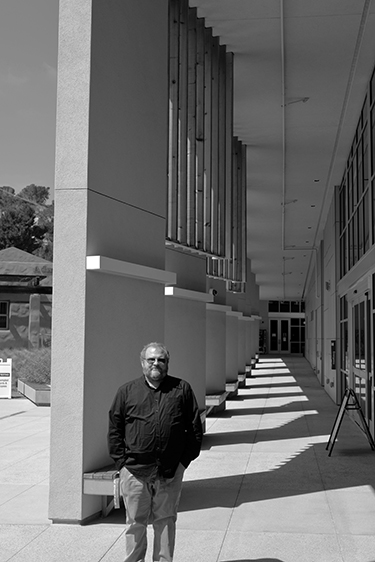 Editor’s Note: This is the 6th chapter in Volume 3 of Editor Emeritus Donald H. Harrison’s 2022 trilogy, “Schlepping and Schmoozing Along the Interstate 5.” All three books as well as others written by Harrison may be purchased from Amazon.com.
Editor’s Note: This is the 6th chapter in Volume 3 of Editor Emeritus Donald H. Harrison’s 2022 trilogy, “Schlepping and Schmoozing Along the Interstate 5.” All three books as well as others written by Harrison may be purchased from Amazon.com.
Schlepping and Schmoozing Along the Interstate 5, Volume 3, Exit 38 (Manchester Avenue): Mira Costa College.
From northbound Interstate 5, take Manchester Avenue exit, turn left onto Manchester Avenue and follow a short distance to Mira Costa College on the left at 3333 Manchester Avenue.
 ENCINITAS, California — Professor Robert Bond is chairman of the history department of Mira Costa College. He divides his time between the San Elijo campus off Manchester Avenue and the Oceanside campus, which is located inland near the College Boulevard exit of State Highway 78. A former Fulbright scholar who did his research in Istanbul, he has a nuanced view about the relationship between Turkiye and Israel.
ENCINITAS, California — Professor Robert Bond is chairman of the history department of Mira Costa College. He divides his time between the San Elijo campus off Manchester Avenue and the Oceanside campus, which is located inland near the College Boulevard exit of State Highway 78. A former Fulbright scholar who did his research in Istanbul, he has a nuanced view about the relationship between Turkiye and Israel.

His doctoral dissertation at UCLA was a historiography, that is, a history of histories. For centuries, the sultans of the Ottoman Empire used to engage Muslim clerics and literary scribes to keep day-by-day records of the events occurring during their reigns. Bond’s dissertation – which he researched in the libraries of the Ottoman Palace and Istanbul University, as well as other archives – helped to identify who those court historians were and the order in which they served in their positions.
He read the reports that the court historians wrote drawing on government documents palace secrets, and day books written by their predecessors. In so doing, he absorbed a considerable amount of history about the Ottoman Empire which, in its heyday, included modern day Arabia (a portion), Bulgaria, Egypt, Greece, Hungary, Iraq, Jordan, Lebanon, Macedonia, Palestine (Israel), Romania, Syria, and Turkiye. The historians’ chronicles indicated that the rulers in Istanbul followed the affairs of Palestine “because of all the different holy sites there,” Bond told me during an April 2022 interview.
“They saw themselves as the custodians of these sites, not just for the Muslim sites but also for the Christian and Jewish populations within their empire,” Bond said. “Jerusalem was a specially administered zone in the empire. Suleiman the Magnificent, in the 16th century, rebuilt the walls of Jerusalem, the ones we see today. The sultans after him spent money on building infrastructure and building and rebuilding baths in the city for centuries afterwards.”
The Ottoman method for ruling the various religious communities in the empire was known as the millet system. Religious communities were allowed self-government so long as they collected and paid taxes to the sultans and kept peaceful relations with their neighbors. Jews in the Ottoman Empire lived primarily in such cities as Istanbul (Turkiye), Baghdad (Iraq), and Salonika (Greece) but there were also small Jewish communities in Jerusalem, Safed, and Tiberias in what would become Israel.
In the 19th century, the Grand Rabbi of Istanbul was appointed head of the Jewish community of the empire, but for more localized affairs, responsibility was placed on rabbis known as hahambasi, a title taken from the Hebrew word chacham (wise person) and the Turkish word bashi (leader).
While some Jews had been settled in the area since biblical times, Sephardim immigrated from Spain following the Expulsion of 1492 and Ashkenazim came later from central and eastern Europe. “The Sephardim brought in a lot of interesting culture such as their connections with Europe and their banking acumen which benefitted the empire a lot,” Bond said. “You had a lot of Jewish bankers and doctors who became close to the Ottoman rulers. Many of the doctors to the sultan were Jews because they had a much higher education in medicine from Spain and Italy.”
In the late 19th century, Zionism grew as a movement with Theodor Herzl publishing Der Judenstaat (The Jewish State) in 1896. Herzl “actually engaged with the Ottoman Sultan Abdul Hamid II and tried to negotiate a Jewish state in Palestine,” Bond said. “One of the things that Herzl offered was that European Jewry would pay off the Ottoman Empire’s debts. But in the end, Herzl was not successful doing that.”
Besides the Sultan’s reluctance to cede control over a part of his empire, there also was opposition to the idea from Ottoman Jews, who were afraid “of being subsumed by the European Jewry who might come in.” Bond paraphrased the UCLA professor under whom he did his graduate work, Stanford Shaw, as saying, “The Jewish community was by no means a completely unified group. They all had their separate synagogues, separate liturgies, and separate ways of looking at authority. But they were unified by the idea that they didn’t want to be subsumed by European Jews.”
Nevertheless, groups of European Jews moved to Palestine during the First Aliyah (1882-1903) and the Second Aliyah (1904-1914), with little interference from the Ottoman Empire. Towards the end of the Second Aliyah, some leaders of the Zionist movement—including David Ben-Gurion—urged “Ottomanization” for their fellow Jews. Ben-Gurion, who was born in Plonsk, Poland, even spent eight months in Salonika, Greece, to study the Turkish language. Prior to World War I, Ben-Gurion favored the Ottoman cause, but after the war broke out, he became part of the Jewish Legion that fought under British command against the Turks. During the same time that Armenians were massacred by the Ottoman Empire, so too were many Jews slain – alternately accused of being British or Russian agents.
After World War I, Turkiye fought a war with Greece, and not long afterwards, the Ottoman Empire collapsed. The League of Nations gave France a mandate to administer Lebanon and Syria, while the British were given responsibility for Palestine, Jordan, and Iraq. A new Turkish Republic was founded, with Mustafa Kemal Atatürk as ita first president. During his administration, Turkiye “adopted a more isolationist view of things,” Bond said. “Atatürk said ‘peace at home, peace in the world,’ which was one of his big slogans. They weren’t really focused on Israel.”
Bond said that his mentor Stanford Shaw wrote a book about neutral Turkiye’s actions during World War II and the Holocaust.
“In France, the Turkish embassy gave passports and visas especially to people who might not have Turkish citizenship but were descendants from Turkish Jews, and to Sephardim,” Bond related. “Some Jews got protected that way. Also, Turkiye facilitated the movement of Jews through eastern Europe through their embassies there. When Holocaust refugees came to the Turkish border, the government instructed its guards to look the other way. Some stayed in Turkiye. Others, with the help of the Jewish Agency and other groups, continued their journey to Palestine.”
How many Jews did Turkiye save? “There is a lot of debate over the numbers,” Bond replied. “Shaw stated that 16,474 ‘official’ Jewish immigrants passed through Turkiye. And an additional 75,000 ‘unofficial’ refugees also transited Turkiye en route to Palestine.”
Atatürk’s successor, Ismet Inönü, had his representative at the United Nations vote against the partition of Palestine in 1947, but two years later, he decided to recognize Israel, making Turkey the first Muslim-majority state to do so.
Turkiye had good relations with Israel through the 1990s, Bond said. “When I was living there, it was the first big boom of Israeli tourists coming to Istanbul and to the beaches in the south. Economically and militarily, Israel and Turkiye were cooperating quite a bit, to the point that Israeli aircraft were training in Turkiye, which was amazing. They developed this relationship because of the regional policy alignments and their worries about Syria.”
Later in the 1990s, Turkiye’s economy imploded with resulting political instability, Bond said. “I had one million lira notes, inflation was so bad. Those guys were changing prices every day, with their products. The whole economy was collapsing.” This aided the rise of the AKP [Justice and development Party] which is an Islamist party under [Recep Tayyip] Erdoğan. “He was mayor of Istanbul while I was living there, a good mayor actually.”
Bond said relations between Turkiye and Israel soured when Ariel Sharon was serving as Israel’s prime minister and Israeli forces assassinated Hamas leader Sheikh Ahmed Yassin in 2004. Erdoğan had good relations with Muslim Brotherhood institutions around the Middle East. Bond said that Israel initially saw those relations as “a good thing because Turkiye could act as a mediator.” However, relations between Israel and Turkiye further deteriorated, to the point of being undone, during the winter 2008-2009 Gaza War, known to Israelis as “Operation Cast Lead.” Israeli Prime Minister Ehud Olmert authorized a ground offensive lasting 22 days in response to thousands of rockets fired from Gaza on Israel’s southern settlements.
Immediately following that war, Bond recalled, “Erdoğan criticized Shimon Peres (then Israel’s President) at the Davos [Switzerland] meeting and they lowered the level of diplomatic relations from ambassadors to much lower than that.”
After Peres had been applauded at that meeting, Erdoğan said “I find it very sad that people applaud what you said. You killed people. And I think that is very wrong.”
In 2010, Benjamin Netanyahu was Israel’s prime minister. The Mavi Marmara, while attempting to break Israel’s blockade of Gaza, was boarded by Israeli soldiers. In the ensuing melee, eight Turkish citizens and one Turkish-American were killed, and others were wounded. Seven Israeli soldiers also were injured. Erdoğan called the raid “state terrorism” and recalled Türkiye’s ambassador to Israel. A year later, Turkiye expelled Israel’s ambassador. The diplomatic rift, which worsened during the 2014 Second Gaza War, lasted six years. In 2016, Israel and Turkiye signed a reconciliation agreement, but following U.S. recognition of Jerusalem as Israel’s capital in 2017, relations again soured with Turkiye expelling the Israeli ambassador.
Harsh statements by Erdoğan about Israel and by Netanyahu about Turkiye were exchanged.
The election of Naftali Bennett as Israel’s prime minister in 2021, along with the selection by the Knesset of Isaac Herzog as Israel’s president, provided an opportunity for rapprochement between Israeli and Turkiye. In March 2022, Herzog visited the Turkish capital of Ankara. Erdoğan called his meeting with Herzog “historic” and a “turning point.”
Bond said the thaw in relations between the two countries was more for economic reasons than because of any ideological understanding between the two countries. “I think Erdoğan wants to tie back into Israel and increase economic activity, which had gone way up and then soured,” he said. “Also, he wants access to the Israeli military-industrial complex because he has been isolated with weaponry after Turkiye bought Russian anti-aircraft missiles. Also, he is very concerned about his interest in the Mediterranean vis-á-vis all the gas they have been finding near Cyprus.”
A common interest between Turkiye and Israel, Bond said, is their “concern about Iran’s influence in Lebanon and Syria. They really don’t want to see Iran being a regional hegemon in Syria and Lebanon and elsewhere.”
Despite the thaw, Bond cautioned, relations between Turkiye and Israel are unlikely to become as warm as they were in the 1990s. “Turkiye is trying to reestablish relations with many countries in the Middle East that they previously had alienated,” he said. “For example, they had been trying to get back in with Egypt and also with the Saudis. The Saudis are very anti-Muslim Brotherhood, while the Turks have been supporting the Brotherhood in Syria. The Saudis don’t like that. They are giving Turkiye a cold shoulder. Once Turkiye improves relations with these countries, Israel may have a better opening.”
Bond has fond memories of travel both in Turkiye and in Israel. The first time he visited Turkiye was after his graduation from Cal State Fullerton and before his graduate studies at UCLA. He went backpacking through Europe and wound up in Istanbul. When he got on a train to return to Vienna, Austria, he found a fellow selling books, including one about the history of the Ottoman Empire. “I read that on the whole train journey, and I decided that I am going to study that place.”
Later when he returned to Turkiye for his doctoral research, he lived on the European side of the Bosporus and archives he needed were on the Asian side. “I always got a kick whenever I had the opportunity to go back and forth between the two continents,” Bond said.
His visit to Isael was at the invitation of a friend who was married to a Yemenite Jewish woman. “I went and visited and stayed with their family for about six weeks in Kiryat Ekron, which is south of Rehovot,” he related. “It was wonderful. I learned a lot about Yemeni Jewish culture. I learned that if you lived there, you were never alone. People will visit you 24/7. Her grandfather was the rabbi of a local synagogue there, and he was a very stern man. He had a switch and would swing it at you if he didn’t like what you were doing. I remember how generous everybody was.”
When he left Israel to fly to Turkiye, “it happened to be Shabbat. I had to sneak out of the house to avoid the grandfather seeing me getting into a car to go to the airport.”
He said another indelible experience was visiting the Yad Vashem Holocaust Memorial and walking through the exhibit that utilized candles and mirrored reflections to simulate one flame for each of the 1.5 million children whose lives were snuffed out during the Holocaust.
Of Protestant background, Bond visited various religious sites in Israel including the Al Aqsa Mosque and the Dome of the Rock; the Kotel, and the Churches of the Nativity in Bethlehem and the Holy Sepulcher in Jerusalem. More than the religious sites, however, the historian was fascinated by historic sites.
“I made my friend pull over at little Crusader castles,” Bond recalled. “He would say, ‘Why are you interested in this?’”
And Bond would answer, “There is a sign there; what does it say?”
*
Donald H. Harrison is editor emeritus of San Diego Jewish World. He may be contacted via donald.harrison@sdjewishworld.com